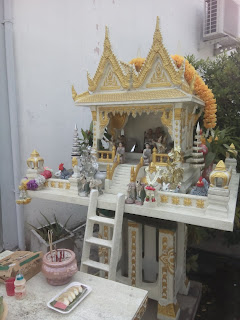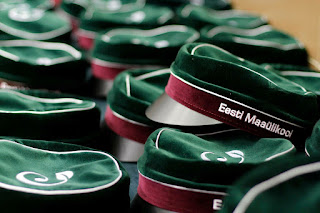Exotic Pets, Exotic Food, and a Rooftop
„Kin khao“ that’s what Silom must have
typed into his translator app. Of course, I can’t read it, but in English it
says: “Eat rice.” It is what it literally means, but the Thai say it in a way
of “have you eaten yet?” and this can also mean “How are you?” So be sure to
always answer in the positive.
He deletes it and keeps trying to find the
right translation. It’s half past twelve and I’m pretty sure he wants to tell
me I can join the people who will have lunch break now.
“Do you still eat rice?” is the next phrase
I see on his phone. Silom is a very shy guy, and I keep looking over his
shoulder . All the vets praise him highly. He is the best assistant they have
here, they say, he can handle and restrain any species perfectly.
“Did you eat me?” I had been about to
answer without him actually addressing me, but after this I just laugh silently
and wait for him to come up with the question he wants to ask. He realizes that
this is not what he wants to know and gives up, turning back to our patient.
When the rabbit is back in her box and Silom goes down the stairs I fear I’ve
missed the chance to have a lunch break today, but he turns around and finally
shows me his phone. “Did you eat?”
I shake my head and he gestures me to
follow him. We collect Dr. Jane, he picks up one of the umbrellas by the
entrance and we’re outside. In the sun. I automatically turn my face into the
light. This half hour break is pretty much the only daylight I get to see. It’s
quite dark inside the Premier Exotic Pet Hospital, where I’m in my last
placement in Thailand. Most of the windows are sealed and the narrow staircases
are of a dark gray. Artificial light and AC dominate our environment – yes, I
live inside the hospital, and so does Silom and a few other staff members.
The emergency room, X-ray, and rooms for
dogs and cats are on the ground floor, up a very uninviting dark staircase is
the waiting room, procedure rooms for exotics, and our kitchen. The second
floor (actually, third, as in Thailand the ground floor is 1), behind a “Staff
Only” sign, houses the mammal and bird patients, next come the reptiles and
some more birds – and the bathroom. I have to carefully step around boxes with
tortoises and bearded dragons to get to the shower. The fourth/fifth floor
(depending on how you count) is our flat, and on the rooftop, where they grow
some plants as animal feed, I can hang my laundry. The view from here is
phenomenal: Small houses of the residential area around, trees between them,
and behind it all, Bangkok’s skyline in the haze.
 The best thing about Prawet, the district
of the clinic, is the market. It’s small and only 700 meters down the road, and
we all actually walk there. How unusual in Thailand! In the morning, I can get
soymilk from the big tank, fresh fruit and sticky rice, all in my own
containers. During lunch break, I let the two girls in the back fill my boxes
with spring rolls and peanut sauce, or fried bananas, or sweet potato balls,
and the two cooks I regularly go to recognize me as well. In one tiny kitchen I
can get Pad Thai, in the other one rice and vegetables. Today, the couple who
cook rice and “pat pak” can’t give me all of my change, so I’ll have to go
there again tomorrow. They still owe me ten baht. That’s how it goes here.
The best thing about Prawet, the district
of the clinic, is the market. It’s small and only 700 meters down the road, and
we all actually walk there. How unusual in Thailand! In the morning, I can get
soymilk from the big tank, fresh fruit and sticky rice, all in my own
containers. During lunch break, I let the two girls in the back fill my boxes
with spring rolls and peanut sauce, or fried bananas, or sweet potato balls,
and the two cooks I regularly go to recognize me as well. In one tiny kitchen I
can get Pad Thai, in the other one rice and vegetables. Today, the couple who
cook rice and “pat pak” can’t give me all of my change, so I’ll have to go
there again tomorrow. They still owe me ten baht. That’s how it goes here.
We order, take some free drinking water,
and then run our errands, like buying the vegetables for dinner. We sit down at
one of the tables in the middle and our food is served. Each of us ordered from
a different place, and all of the kitchens collect their own plates and cups
later on. Behind some of the giant pots are babies’ cribs, young children run
around and go buy missing ingredients for their parents. I could sit here all
day, eat and watch what’s going on here, all the people, the cats underneath
the tables, the kids growing up surrounded by all the different smells of these
foods. I’m fascinated how well the system works. Nothing gets lost.
But we have to go back to the hospital.
The staff work in shifts, one from eight to
six, the other from eleven to nine – that’s how long we’re open. The Thai
students have to stay from nine to nine, but as I live upstairs, I have some
more freedoms. For example, cooking dinner at seven with the other foreign
student. That’s right, for the first time in Thailand, I have access to a
stove!
Dr. Top peeks into our pan. “What are you
cooking?”
We exchange a look. Well, everything that
looked good at the market and didn’t come in plastic…
“Aha, DIY food!” he names it. All right.
Do we do anything but eat?
Why, yes, we fold gauze, for example.
First thing in the morning, I carry the
reptiles out to the balcony, where they can catch some sunlight and sometimes
walk around freely, as they can’t fall down. The cat with chronic kidney
disease gets his IV fluids. We feed the rabbits and in the bathroom, perform
fly tests with the pigeons. Those who pass (and aren’t pets, obviously), are released
back into freedom from the rooftop. I go downstairs, but all the lights are
off. So we fold gauze.
Back downstairs: A squirrel monkey is here
for a check-up. One guy wants to know the gender of his green-cheeked cornure,
which requires a genetic test. There is a rabbit for dental treatment and a
hedgehog to get dewormed. A prairie dog for vaccination. It’s not too busy, so
we have time to watch the bearded dragons and play with Chiro, the cockatoo. He
has a behavioral disease and needs some human contact. He looks up when I come
into the room and jumps onto my arm as soon as I open his cage. There, he seems
quite content.
On the day before my last, Dr. Golf seems
to have given his employees a talk, for suddenly, they let us administer drugs
and call us to see procedures. We practice to draw blood and examine teeth in
rabbits and get a short course in the handling and examining of reptiles and
blood sampling in birds.
Or we have to watch the rabbit in the
“Rabbit Playground”.
But if nothing happens anymore, we always
have that gauze, waiting to be cut and folded into the pieces you see in the
doctor’s office. This seems to be the most popular assignment for Thai interns.
Well, somebody has to do it.
And then, of course, there are some snacks.
Spicy banana chips for example, that are called “banana break broken” in Thai.
Because once you’ve tasted them, you can’t stop eating.
 |
| This is the clinic's ghost house. We asked the ghosts for permission to stay here, and so far, they haven't done any harm. |














Kommentare
Kommentar veröffentlichen